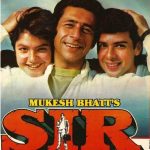‘My Name Is Khan’ (2010) is a film about the arduous journey of Rizwan Khan, a brilliant Muslim man with Asperger’s syndrome, to meet the President of the US and deliver a simple message: “My name is Khan and I am not a terrorist.”
This Karan Johar directorial is a skillfully woven tapestry of themes, all of which are explored with intelligence and maturity. The film’s basic storyline is expanded to include a wide range of topics, from Islamophobia and post 9/11 discrimination to love, loss and redemption. The themes are so interwoven between the plots that it can be difficult to discern which one is at the forefront at any given moment.
Rizwan Khan’s (Shah Rukh Khan) journey from childhood (Tanay Chheda) to adulthood is marked by his mother’s (Zarina Wahab) unwavering determination to give him the best education possible, both formal and informal, so that he can grow up to be a good person. His brother (Jimmy Shergill), who has settled in the US after completing his higher studies, eventually sponsors Rizwan to join him. Rizwan’s initial experiences in his new country are a mix of humour and sadness, until he meets Mandira (Kajol), a Hindu single mother, who works in a hair salon.
Mandira, who also has a troubled past life, Rizwan decides to marry her. Mandira falls in love with Rizwan in a heartwarming way. However, the aftermath of the September 11, 2001 attacks changes the equation for the couple and Rizwan embarks on a mission to prove that he is not a terrorist. Driven by his strict upbringing and his love for Mandira, Rizwan goes to great lengths to accomplish his mission. ‘My Name Is Khan’ is a story about Rizwan’s journey and his unwavering commitment to his beliefs.
Johar took a big leap in direction and got his hands dirty by making such a movie, where multiple messages reach the viewers in a very subtle channel, SRK and the themes.
‘My Name Is Khan’ explores a variety of themes that are relevant to our lives, regardless of their connection to the film’s main theme of terrorism. From the opening scenes to the end of the movie, motherhood is portrayed with realism, love and tenderness. In fact, maternal instincts are so strong in the storyline that they form the crux of the story.
The movie also explores the psychological impact of the 9/11 attacks on Muslims in the US. Even though Muslims strongly condemned the attacks, they had no control over the spread of false propaganda about their religion. The film respectfully depicts Islam and shows how a marriage between a Hindu (Mandira) and a Muslim (Rizwan) is possible. The writers stunningly incorporate scenes that show how to find social acceptance in a country where there is a negative perception of one’s religion, which is being targeted by the media and a certain section of the population. These scenes are filmed with such realism that some viewers may find themselves relating to them.
Historical events such as the Hindi-Muslim riots in 1983 in India, the September 11 attacks and the 2008 Presidential Election in the US are added in the backdrop to further elevate the storyline and render it more credible.
No wonder, Karan Johar garnered immense applause worldwide for his honest and sensitive storytelling. His attention to details is exceptional as well as running multiple themes in parallel. We got to watch the most matured side of Johar.
On the other hand, after ‘Rab Ne Bana Di Jodi’ (2008), SRK’s return in this movie is simply outstanding and a class above. His facial expressions, dialogue delivery and behaviours are first-class and he carries the movie on his shoulders till the last frame. Due to the disease, he repeats many of his ending sentences and some of them are done deliberately to joke around. A grim, moody and determined Rizvan is a revelation of SRK’s talent, which was not unknown to us, but was not extracted with such sincerity and professionalism.
Kajol is terrific in her role as the hair dresser, the single mother and the wife. She looks natural in all the scenes and even appears with little make-up in some of them; increasing the reality of the dramatic scenes. If you’ll fall in love with the character of Rizvan after a little time through the movie, then expect an immediate connection with Mandira in the first scenes itself. Needless to comment on the chemistry between Rizvan and Mandira, it is still alive.
Shankar-Ehsaan-Loy’s music is mainly used in the background as interludes in certain places, with constant pauses, to allow for further scenes to develop, before picking up again. Overall, all the songs remain situational and the music only aids in moving the story ahead. “Tere Naina” is the compulsory Karan Johar-SRK track and is wonderfully shot and gets repeated twice. “Noor E- Khuda” receives an acclaimed picturization, which brings tears to the eyes. “Sajda” is equally good and happens at the right time. Lyrics by Niranjan Iyengar capture your attention, while the background music by the composer trio is relevant.
‘My Name Is Khan’ is a mature movie, made for an audience, who’s looking for a meaningful and partly realistic cinema, without the entertainment quotient. One has to admit that it’s an intelligent movie, which has been thoroughly researched over the years and magnificently executed in its entirety. Karan Johar has made a movie for an international audience, which connects with everyone in the most sensitive way. The treatment of Islam, terrorism and motherhood opens the road for other themes to be explored deeper.
Rating: 4/5

